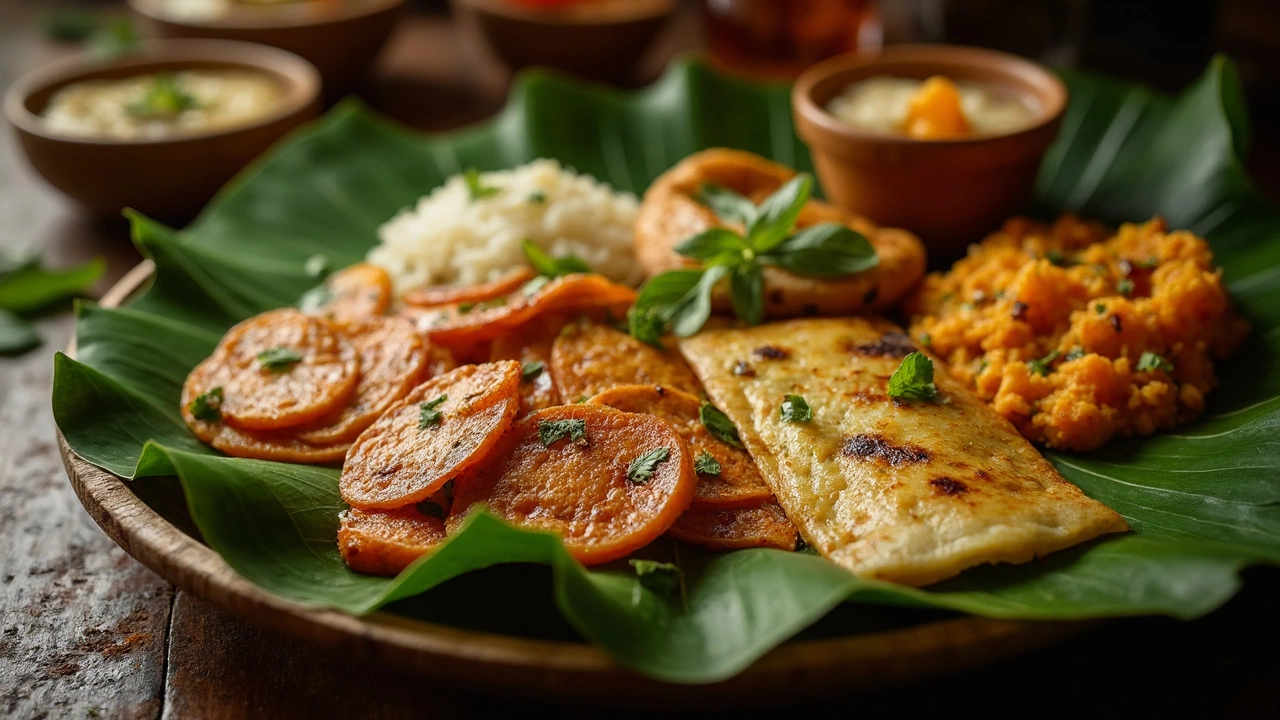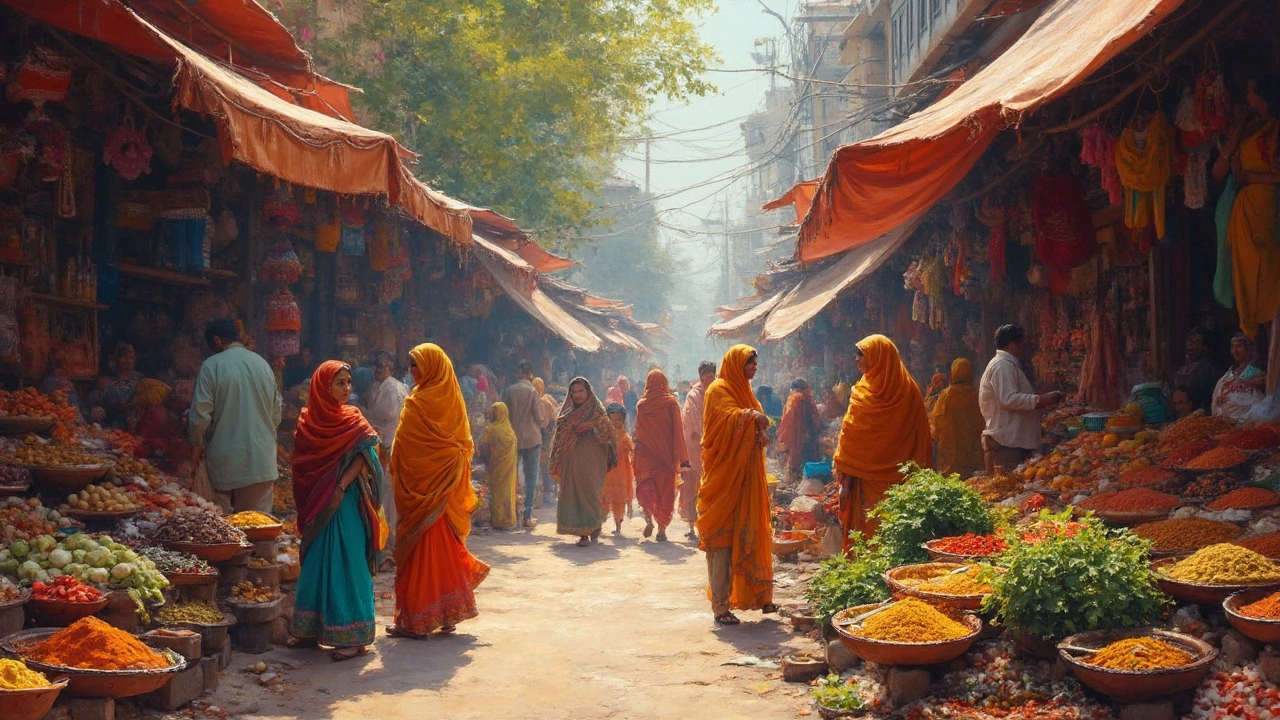7 Mar 2025
- 0 Comments
If you've ever been curious about vegetarianism in India, you're in for a treat. India is a country where food isn't just nutrition; it's a tradition, a lifestyle, even a celebration. So, why are certain Indian cultures so passionate about vegetarianism? Let's dive into the religious beliefs, regional dishes, and health practices that make vegetarianism in India a way of life.
First things first, religion plays a huge role here. Communities like the Jains, whose strict diet avoids harm to any creature, are strictly vegetarian. Then you've got many Hindus and Buddhists who also lean heavily towards plant-based diets as part of their spiritual practice.
The great thing about India is its regional diversity, and this extends to food. The Gujarati thali, a vegetarian feast from the Gujarat region, offers an incredible variety of flavors and textures. In the south, dishes like dosa and idli are vegetarian staples, pairing perfectly with vibrant chutneys. Ever tried them?
- Vegetarianism in Indian Religions
- Regional Variations
- Famous Vegetarian Indian Dishes
- Cultural Significance
- Health Benefits and Practices
- Embracing Indian Vegetarian Cuisine
Vegetarianism in Indian Religions
India is home to a variety of religions, many of which play a big role in promoting vegetarianism. This dietary choice isn't just about food; it's deeply intertwined with beliefs and ethical practices.
Hinduism
Hinduism, one of the major religions in India, has a long-standing relationship with vegetarianism. Many Hindus practice vegetarianism to uphold the principle of 'ahimsa,' or non-violence. They believe in not harming living beings, which aligns with avoiding meat. Dairy, however, is generally accepted.
Big Hindu festivals, like Navratri and Diwali, often see families preparing extensive vegetarian dishes, emphasizing the purity and sanctity associated with this diet.
Jainism
Jainism takes vegetarianism to another level. Jains follow an extremely strict plant-based diet, avoiding root vegetables like onions and garlic too. The reason? Pulling up root vegetables harms the living organisms in the soil.
Jains also avoid eating at night, sticking to eating practices that bless the body with both health and peace, making it quite a unique religious approach to vegetarianism.
Buddhism
Buddhism also values non-violence, with many Buddhists adopting vegetarian diets. However, whether or not to be strictly vegetarian can vary across different Buddhist communities.
In some parts of India, especially in the north, vegetarianism is seen as a way to avoid creating karma, aligning with spiritual goals.
Sikhism
Sikhism doesn’t enforce vegetarianism but places an emphasis on eating simple and wholesome food. Many Sikh families, especially in India, prefer vegetarian meals at Gurudwaras (Sikh temples). The 'langar', a communal meal served at all Gurudwaras, is always vegetarian, making it accessible to people of all dietary preferences.
Here's a glimpse of the religious landscape where vegetarian cultures in India emerge not just as dietary preferences, but as meaningful practices embodying peace, ethics, and spirituality. Living in a country with such diverse beliefs, it’s fascinating how these ancient traditions continue to blend into the daily lives of millions.
Regional Variations
India's love affair with vegetarian food varies from region to region, each with its unique twist and taste. Let's start with the Indian vegetarian cultures of the North. Punjab is famous for its rich and buttery vegetarian dishes like paneer makhani and sarson da saag. The people here aren't shy with spices or cream, making their food a hearty affair.
Heading south, the cuisine switches gears. The Southern states rely heavily on rice, lentils, and coconut. Dishes like sambhar and rasam are dietary staples, along with beloved snacks like dosas and idlis. Every region has its own rendition, but the central theme of using local produce and spices remains strong.
In the West, focus your attention on Gujarat, where the food is predominantly vegetarian. This state offers a delightful mix of sweet, salty, and spicy flavors, with dishes like dhokla, khichdi, and the ever-popular Gujarati thali. This colorful platter offers everything from spicy curries to sweet desserts in one go.
The East might surprise you with their vegetarian delights. While fish and rice dominate the scene in Bengal, vegetarians aren't left out. Dishes like shukto, a mixed vegetable curry, and aloo posto, potatoes cooked with poppy seeds, reveal the diversity of vegetarian dishes in this region.
These regional variations in India not only offer a diverse taste palette but also reflect the cultural and environmental factors influencing food habits. Whether you're trying vegan options or interested in learning new diets, you'll certainly find something that aligns with your palate across India. Pick a region, try their dishes, and it's like a culinary trip without ever leaving your kitchen!
Famous Vegetarian Indian Dishes
Indian cuisine boasts a treasure trove of vegetarian dishes that not only tantalize the taste buds but also tell their own stories. Across the country, from bustling cities to quiet villages, locals have mastered the art of creating mouth-watering meals using legumes, grains, and vegetables. Let's explore a few must-try dishes that deserve a spot on everyone's menu.
Chole Bhature
This dish is a North Indian favorite, especially around Punjab. It combines spicy chickpeas with fluffy deep-fried bread (the bhature). It's a comfort meal, often enjoyed with pickles and a glass of refreshing lassi. Ronald Indira, a well-respected chef said,
"Chole Bhature is not just food. It's an experience of textures and spices."
Paneer Tikka
Paneer, a type of Indian cottage cheese, takes center stage in this beloved dish. Marinated in a blend of yogurt and spices, it's then grilled to perfection. Usually served as a starter, Paneer Tikka is a hit at parties and gatherings.
Masala Dosa
A crispy crepe from South India, filled with a spicy potato mixture. People line up at street vendors just to grab a bite of this classic. It's often served with sambar (a spicy lentil soup) and coconut chutney.
Palak Paneer
This is a rich blend of spinach and paneer, often seasoned with garlic, onions, and various spices. It's best paired with rice or roti, and is loved for its nutrient-packed profile.
India's diversity isn't just limited to culture but is vividly reflected in its cuisine. Dishes like these highlight the creativity and flavors native to the regions. Interested in diving deeper? Explore more about vegetarianism in Indian cultures and the health benefits these dishes offer!

Cultural Significance
When we talk about the vegetarian cultures in India, it’s more than just a dietary choice; it’s a way of life steeped in history and beliefs. This is where tradition meets taste.
The importance of food in Indian culture can't be overstated. Take the Jains, for instance. Their strict vegetarianism is rooted in the principle of 'Ahimsa', which means non-violence. For them, it's about compassion and minimizing harm to all living beings. This belief isn't just limited to what they eat but extends to every aspect of how they live.
Hindus also have deep-rooted beliefs involving food. For many, eating vegetarian is a tribute to nature and a way to ensure purity and self-discipline. In fact, during festivals and religious ceremonies, vegetarian meals are typically the standard as they symbolize cleanliness and spirituality.
Interestingly, because of India's diverse traditions, the cultural significance of vegetarianism manifests in vibrant celebrations and festivals. In Tamil Nadu, the Pongal festival features a special vegetarian dish of the same name, symbolizing prosperity. Similarly, Navratri, celebrated across India, is marked by nine days of fasting or abstaining from non-vegetarian food.
Moreover, vegetarianism connects with regional cuisines—it reflects the bounty of local produce and traditional cooking methods. Whether it’s the tandoor-baked breads of Punjab or the rich spice-infused curries of Rajasthan, each dish is a cultural expression.
Here’s a fun tidbit: Did you know that according to a government survey, more than 30% of India’s population identifies as vegetarian? That’s millions of people sharing a lifestyle that has shaped their cultural identity over centuries. Now that’s significant!
Health Benefits and Practices
Diving into the health benefits of a vegetarian diet, especially as seen in diverse Indian cultures, there's a lot to love. People don't just choose it for religious or ethical reasons; it's a lifestyle with real perks. So, what are these benefits?
Rich in Nutrients
Indian vegetarian meals are often rich in essential nutrients. With a range of vegetables, lentils, and grains, these dishes ensure you're getting a mix of vitamins, fiber, and other nutrients. Take dal, for instance. It's not just tasty but also packed with protein, making it a great meat alternative.
Heart-Healthy
Many vegetarian Indian dishes use minimal oils and focus on whole ingredients. Eating more whole grains and legumes can help lower cholesterol levels and reduce heart disease risks. Throw in some spices like turmeric and garlic, common in Indian cooking, and you've got a recipe for better heart health.
| Nutrient | Source |
|---|---|
| Protein | Lentils, Chickpeas |
| Fiber | Whole Grains, Vegetables |
| Iron | Spinach, Legumes |
Weight Management
With high fiber content and low calories, many Indian vegetarian dishes can aid weight management. They fill you up without overloading on calories, helping keep that waistline in check.
Practical Tips
When you're switching to or exploring a vegetarian diet, especially an Indian one, variety is key. Don't just stick to one type of lentil or veggie. Mix it up! And if you're concerned about protein, include dishes with chickpeas, paneer, or tofu.
- Mix different grains like rice and quinoa for variety.
- Include a small serving of nuts for healthy fats.
- Spice it up—turmeric and cumin are not only tasty but healthy too.
Embracing a vegetarian lifestyle as seen in Indian cultures not only boosts health but also expands your culinary horizons. Give it a try, and you might just find your new favorite meal!
Embracing Indian Vegetarian Cuisine
Getting into Indian vegetarian cuisine is like embarking on a flavorful journey across a rich, cultural landscape. Trust me when I say that, even if you're a meat lover, these dishes have the power to win you over. So, what makes Indian vegetarian dishes stand out? Imagine fresh veggies, legumes, spices, and herbs coming together to create mouthwatering meals that are nutritious and delicious.
Understanding Spices
A defining factor of Indian cuisine is its vibrant use of spices. We're not just talking chili pepper here; think of cumin, coriander, turmeric, and mustard seeds—all contributing to an unforgettable taste. These spices aren't just about flavor; they're also packed with health benefits. Turmeric, for instance, is known for its anti-inflammatory properties. Cool, right?
Staple Ingredients
A traditional Indian vegetarian meal often includes lentils or chickpeas as the main protein source. Combined with rice or flatbreads like naan or roti, these dishes are balanced meals. Names like chana masala or dal tadka might seem complicated, but they're essentially spiced chickpeas and lentils, commonly enjoyed across households.
Popular Dishes
Ever tried matar paneer? It's a creamy curry with green peas and soft cheese known as paneer. Perfect for scooping with naan. Then there's aloo gobi, a comforting dish made with potatoes and cauliflower. These meals offer a satisfying bite for anyone interested in delving into the world of Indian vegetarian dishes.
Simple Indian Meal Plan
- Breakfast: Start with a plate of idli, light steamed rice cakes, best enjoyed with coconut chutney.
- Lunch: A balanced thali, which usually includes dal, rice, a vegetable curry, chapati, and a small dessert.
- Dinner: Consider a warm bowl of rajma (kidney beans) curry served with steamed basmati rice.
Want some fun trivia? A recent survey showed that around 40% of Indians identify as vegetarians. That's roughly 500 million people! No wonder India leads the way in vegetarian food culture. So there you have it—the simple pleasures of vegetarian Indian dishes are at your fingertips. Ready to try them?
